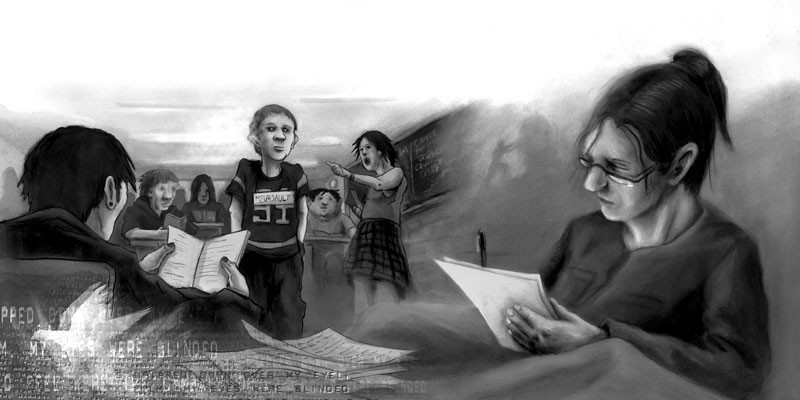
“As if that blind rage had washed me clean, rid me of hope;
for the first time, in that night alive with signs and stars,
I opened myself to the gentle indifference of the world.”
—Albert Camus, The Stranger
1. The Sunday blues are back, familiar and unwelcome like symptoms of an old illness.
Sundays became my nemesis in high school, especially the nights, which I’d spend biting my nails and lying sleeplessly in bed, cataloguing all that was wrong with my life. I asked myself more depressing questions about my future on Sunday nights than at any other time.
The current relapse of the Sunday blues is even worse. Now, instead of attending high school, I teach there. When Sunday night rolls around, I feel as though I’m being forced into the spotlight in front of a tough crowd, and there’s nowhere to hide.
The toughest crowd is my senior World Literature class – 17 students, five of whom require special modifications and accommodations. The students’ range of skills and interests runs the gamut, but most aren’t big fans of reading and none of them likes to write. My most recent attack of the Sunday blues is exacerbated knowing that the next morning, I have to explain absurdism and introduce Camus’ The Stranger.
2. “What do you mean, life has no meaning?” they ask. The emo kids smirk at each other – they’ve known this forever. I pose some classic existential questions: why are we here? What is our purpose in life? What are we meant to do? I tell them that Camus thinks there is no purpose or meaning for humans, that our efforts at finding meaning inevitably fail, and are thus absurd. They stare at me emptily.
“So basically, you go with the flow,” I say.
In the following days, my students saunter into class after the bell, insisting that it’s better than rushing, or that they were too busy going with the flow to finish chapter three. I interpret this as a good sign – it’s better than silence, or that lobotomized stare.
As I reread The Stranger, I can’t help interpreting the book as a personal message from Camus about the past couple years of my life – my struggle to come to terms with the death of my father and what his death suggested about the way the universe works (or doesn’t). What did it mean that I spent the two years after his death in my hometown of Kalamazoo, that I turned 30 in the same place I was born, that I had no idea what to do with my life?
In those two years back in Michigan, I found no answers to my questions. Largely because I believed my search for meaning wouldn’t yield anything in Kalamazoo, I moved to Boston, which seemed to hold more promise, stones yet unturned. Initially, the novelty consumed me, but after a few weeks, the questions returned, along with the Sunday blues.
3. Camus would say that I didn’t find the answers because the answers don’t exist. He may be right.
4. In The Stranger, Meursault responds very differently to his mother’s death than I did to my father’s: “Maman died today. Or yesterday maybe, I don’t know.” He simply doesn’t react and is more concerned about coffee and the brightness of the sun. My suffering over the unfairness of my dad’s death would have struck Camus as pointless. I couldn’t have responded like Meursault, but I recognize the wisdom in his response. The human condition is one of mortality, so death isn’t sad or unfair or surprising – it just is. Death is inevitable, but sadness is not.
My students, though, go to great lengths to explain away Meursault’s response to his mother’s death and his general lack of affect. “He’s in shock,” they say. “He’s numb.” They don’t care if the text doesn’t support these theories; they can’t accept the idea that Meursault’s mother’s death doesn’t mean anything to him. They persist in assigning a recognizable humanity to Meursault because he makes them uncomfortable. What kind of person is he, they ask – which raises the question: is Meursault human? Suddenly, we find ourselves in the midst of a real and relevant conversation. The glazed looks are gone and hands wave in the air.
The book gives the students new ideas to consider and to rail against; they want to prove Camus wrong. They search for meaning in a book that celebrates life’s meaninglessness. “You’re making us read this book, so it must mean something,” someone half-jokes. “And you tell us that this class has meaning, so that’d better be true, too.”
5. Unlike my students, I’m attracted to absurdism, largely because it asserts the pointlessness of angst and dread. I’m attracted to the simplicity – the idea that what happens happens, and has no larger meaning. There’s no reason to get caught up in anything because we aren’t important. But I can’t tell these teenagers, whom I’m supposed to encourage to dream big, that we – that they – aren’t important.
My students desperately want Meursault to snap out of it. Even after he shoots the Arab for no reason at all – “because of the sun,” – they’re heartened when he experiences discomfort at being labelled a criminal – he cedes, even if only temporarily, to the meaning that label carries. There’s even a moment when Meursault has “the stupid urge to cry, because [he] could feel how much all these people hated [him].” For a beat, Meursault is recognizably human. But it doesn’t last. When the chaplain visits him in prison, Meursault not only rejects God, but insists on life’s absurdity. Ultimately, Meursault can’t escape the consequences assigned to society’s meaning because they include his death. He succeeds in asserting his absurdist world view until his execution, at which point society’s imposed meaning consumes him.
Venturing into uncharted territory, I suggest to my students that because Meursault remains true to himself, because he thwarts society’s attempt to impose its values onto him, he’s a hero – at least, in Camus’ eyes. This makes the class squirm. They ask how a murderer can be a hero. It’s a question so reasonable that it seems almost rhetorical. It’s an opening; my favourite teaching moments come from flipping the obvious, subverting the expected.
My students understand that I’m asking them to go someplace heady and strange and possibly uncomfortable. Some of them actually rub their temples. But most of them are game to see where such questions lead. Curiosity indicates trust and receptivity; a few have said that this is the most bizarre book they’ve ever read, that they’ll keep reading if only to see how much stranger it gets.
6. Camus, I tell them, claims we have three choices once we realize that the search for meaning is absurd: we can commit suicide, take a leap of faith or accept life’s absurdity. Upon realizing life’s meaninglessness, most people either kill themselves or invest in God. Camus rejects suicide because it’s a concession that life isn’t worth living and he considers putting all of one’s eggs in the God basket an irrational and desperate attempt to find meaning. Camus suggests instead that we should accept life’s absurdity and enjoy the freedom and peace to be found in the absence of meaning. It doesn’t matter if Meursault moves to Paris or stays in Algiers, if he marries Marie or if Salamano beats his dog. It doesn’t matter if Meursault kills a man or if he’s put to death. Meursault emerges as a true nonconformist because he doesn’t just revel in absurdity – he actually creates personal meaning by embracing it.
“Sometimes our conversations go like this,” one of the students says, tracing an infinity sign in the air. They still like the idea of going with the flow and a couple of them consider Meursault a badass. They follow Camus’ logic to a point – they too reject suicide and, interestingly, most of them reject the leap of faith, which leaves only door number three.
“But it’s not like you have to go kill a guy because the sun’s in your eyes,” they say. “So you accept life’s absurdity. What does that mean?”
“Well, nothing,” I say, “which is kind of the point.” But it has big implications. What resonates with me is Camus’ argument that accepting life’s lack of meaning grants total freedom. Freedom from destiny, from society, from personal fears and desires. This freedom allows us to define ourselves and to give life the meaning it doesn’t inherently have.
Maybe because they’re minors who have to go to school, they can’t really grasp the concept of total freedom. Maybe I can’t really grasp it either: it’s precisely this freedom that scares me about having moved to Boston. Before, the limitations of Kalamazoo held me back, or that’s what I told myself. Now, nothing holds me back from the answers I’ve been looking for. So where does this leave me, other than sleepless on a Sunday night, again?
7. Sartre defines dread as the fear of nothing. The classic example is the man who is afraid of falling off a cliff, but is also afraid he might throw himself off because nothing is holding him back. Boston is my proverbial cliff: now that nothing’s holding me back, I can do anything. I can also do nothing, and this time I can’t blame it on geography. I wonder whether the Sunday blues reflect the challenges of the classroom or my fear of the freedom gained by my move. Regardless of the answer, staring over the edge of the cliff doesn’t change anything, except perhaps to make me unhappy.
I ask the students whether Meursault is happy. Most of them start off saying no. How could he be? He doesn’t love anyone, he doesn’t care if he or anyone else lives or dies. But, they clarify, Meursault does seem content when he eats a rare cut of lamb or takes a nap in the sun or has sex with Marie. I ask them to articulate the difference between being content in the moment and being happy. What does it mean to be happy? One student points out that being happy doesn’t mean anything – happy just is, and you either feel it or you don’t, which is why Meursault pursues physical pleasure. Pleasure is a natural bodily response – there’s no thinking or meaning involved. So perhaps Meursault is happy after all.
The students sit with that, foreheads wrinkled, noses scrunched as if there’s a bad smell in the room.
Maybe, I suggest, we should ask ourselves why we’re uncomfortable with the idea that he’s happy. Some of the students, mostly guys, lower their eyes. Others, mostly girls, raise their hands. “We don’t want him to be happy,” one says. “He doesn’t deserve it,” someone else says. “We don’t really like him,” another admits. I’m impressed at their insight and candour despite the fact that they’re proving Camus’ point by imposing their own values onto Meursault. Even though Meursault is morally reprehensible, I still want them to be able to understand his point of view. I want them to make judgments based on knowledge, but more than anything, I want them to be capable of compassion, even toward the strange or the unsavoury.
“Get this,” I say: “Camus claims that happiness is the brother of absurdism.” Pause. “You know how I say that you can make the craziest argument in the world, as long as you back it up?” Another pause. “Don’t you want to know how Camus backs it up?” The question is rhetorical – I’m already pulling a stack of handouts from a folder.
8. I hand out an excerpt from Camus’ “The Myth of Sisyphus,” the essay in which he first defined absurdism. “Happiness and the absurd are two sons of the same earth. They are inseparable. It would be a mistake to say that happiness necessarily springs from the absurd discovery. It happens as well that the feeling of the absurd springs from happiness.”
“Can you see how acceptance of absurdism – the relief of not having to make sense of anything – might be joy?” I ask. Their faces go blank. “Stay with me,” I say. “Let’s talk about Sisyphus.”
“This poor dude has to push a boulder up a mountain forever?” someone asks. I nod. They spend a few minutes trying to find a loophole. Perhaps Sisyphus can make it to the top when the gods aren’t looking. I tell them that the punishment is a curse, that the boulder always rolls back down, that Sisyphus’ task is eternal.
“Harsh,” they say.
Despite Sisyphus’ endless punishment, Camus argues that “the struggle itself toward the heights is enough to fill a man’s heart. One must imagine Sisyphus happy.”
“How can Sisyphus possibly be happy?” they ask. “He’s way worse off than Meursault.”
I explain that Sisyphus is happy because he has embraced his circumstance – he doesn’t wish to do or be anything else. The journey is the destination. “Sisyphus goes with the flow,” one says. “He actually likes it,” someone else marvels.
Camus’ argument is sound, beautifully written and compelling. But looking at the graphic of Sisyphus and his boulder on the handout makes me sad on a gut level, and no matter what Camus says, that does mean something. I realize I’ve drawn a line – I can only go with the flow so far. There’s something to be said for changing course, for turning upstream.
9. Instead of writing essays on The Stranger, the students stage Meursault’s retrial. Meursault can’t deny that he shot the Arab, so the trial focuses on whether the shooting was premeditated and what the appropriate sentence is. There are three lawyers on each side, four witnesses, a jury, and I’m the judge.
When the lawyers badger the kid playing Meursault, he’s all shrugs. The mild tone in which he describes shooting the Arab because the sun was in his eyes suggests rationality and lack of remorse. Marie fakes tears on the stand, admitting that Meursault doesn’t really love her. The kid playing Raymond looks appropriately sketchy. Then, from out of nowhere, the defence argues that Meursault is crazy – that either he’s not grieving because he’s insane or that grief has driven him mad. He needs help, they say.
I’m frustrated that they still don’t understand that Meursault acts of his own volition. I exercise judicial prerogative and ask Meursault if he thinks there’s anything wrong with him. He says no. “Do you want to change?” I ask. He shrugs and says, “No, why would I?” The jurors exchange glances and the defence glares at me. But in the end, even though it wasn’t presented as an option, the jury finds Meursault insane and elects to send him to a facility for treatment.
When the jurors explain their decision, I realize that it’s not because they don’t understand Camus; rather, they reject absurdism. And so do I.
10. Although our rational minds may protest, we find Meursault’s pursuit of sensual pleasure lacking. Sleeping, swimming, sex, smoking, eating, drinking – it’s all momentary and physical, and allows for no intimacy or real connection with others. He doesn’t strive for anything more, and although he’s okay with that, we’re not.
More than that, absurdism is a rejection of hope. This is why the crucial moment for Sisyphus comes as he walks down the mountain, in the breath before his next ascent. Sisyphus is free of hope. Because Sisyphus cannot refuse his task, any hope of it ending or changing is pointless and will only bring misery. Only by refusing hope can Sisyphus accept the doubtlessness of his task, which generates his ability to live, to keep pushing and to be happy.
The jury sends Meursault to an institution because they still have hope for him, even if he has none for himself. As inhuman as Meursault seems, they find compassion for him, and in so doing, create meaning that not only surprises me, but actually applies to my life outside of the classroom. I feel a twinge of sadness as I collect their copies of The Stranger, but it’s quickly replaced by anticipation when I pull the next book on the syllabus, The Metamorphosis, from the shelf.






